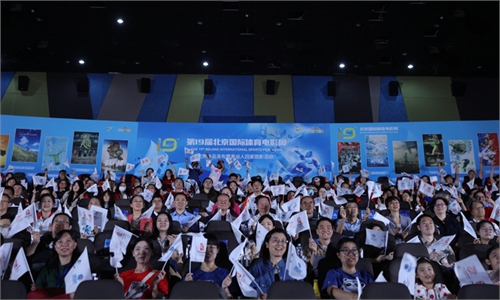Chinese viewers resonate with Oppenheimer's reflections on nuclear risks as Japan dumps contaminated water

The photo taken on August 25, 2023 shows the poster of the film Oppenheimer in a cinema in Shanghai. Photo: VCG
The victory of Christopher Nolan's biographical thriller film Oppenheimer has extended to Chinese cinemas as the film raked in 300 million yuan ($41.1 million) at the box office in the 10 days since it was released in the Chinese mainland.
Based on the life of US theoretical physicist, also known as Father of the Atomic Bomb, J. Robert Oppenheimer, the film explores his invention of the atomic bomb and the implications of the creation of the deadly weapon. It has received a stellar rating of 8.8/10 on Chinese media review platform Douban from more than 400,000 reviews.
The victory of Oppenheimer is to some extent surprising to some Western media as they deemed that a movie telling the story of how the US entered into the atomic age and containing the well-known anti-communist hysteria of the post-war period might not seem like a straightforward sell in a so-called increasingly nationalistic China.
Nolan's popularity in China may be a one-of-a-kind factor to the film's victory, but what has resonated and touched the audience more is Nolan's view of science and technology expressed through the movie.
The film's examination of Oppenheimer's moral crossroads serves as a cautionary tale, urging viewers to reflect on the potential ramifications of scientific advancements and the importance of ethical decision-making in the face of progress. Today's moviegoers are faced with the same question as Oppenheimer, given the huge breakthroughs and changes in many scientific fields, including gene editing and artificial intelligence (AI), which are expected to affect the development of mankind. For example, what exactly can these technologies bring to humans? How will they change humanity? This is the same situation that Oppenheimer faced after seeing the atomic bombs take away hundreds of thousands of innocent lives in Hiroshima and Nagasaki.
Oppenheimer was very uneasy about the atomic bombs he built being used to destroy Hiroshima and Nagasaki. His uneasiness is not in line with the current sentiment against Japan on the Chinese internet. However, at the same time, being able to accept and welcome this film shows the overall open attitude of Chinese people. While the film has been boycotted in Japan, China's opening up in this context is particularly gratifying. The film's release in China deserves praise, some observers said.
To Chinese people, the reflections on nuclear weapons is more realistic and urgent today as Japan, the first and only country in the world to have been bombed by atomic bombs, is dumping Fukushima nuclear-contaminated wastewater into the ocean, opening Pandora's Box again.
Ironically, it is on the same day, August 22, when Oppenheimer was premiering in China, that the Japanese government confirmed that Fukushima nuclear-contaminated wastewater would be officially dumped into the ocean starting August 24.
From a historical perspective, no one understands the dangers of nuclear power better than the Japanese. It is irresponsible and shameless for Japan, which has suffered so much from nuclear harm, to forget its pain and put the whole world in a dangerous position with the unpredictable impact of nuclear radiation.
It is easy to boycott a movie, but ignoring opposition and putting the world at risk of another nuclear crisis is the real betrayal of history and mankind seems to still have a long way to go before they can really learn from history.



